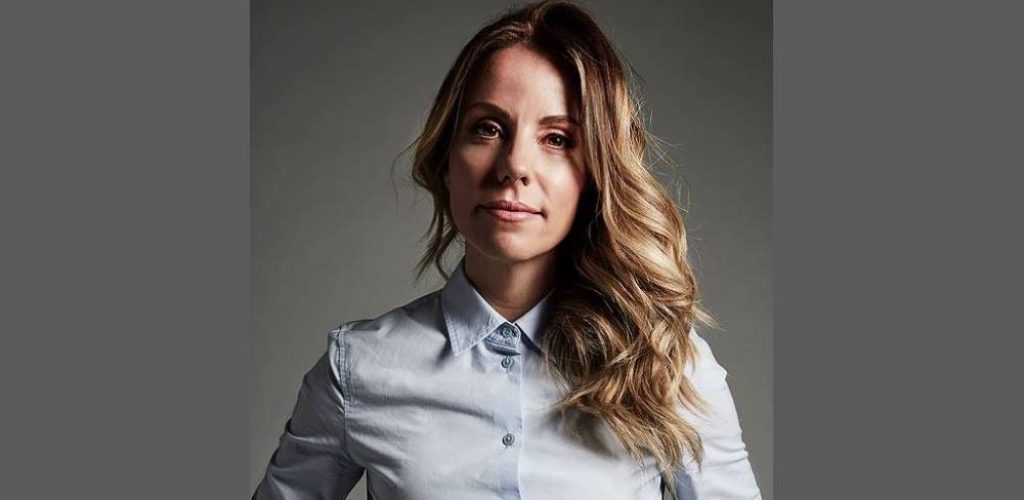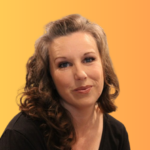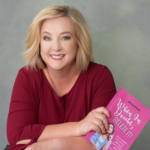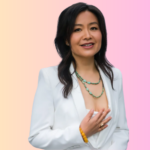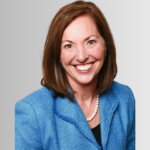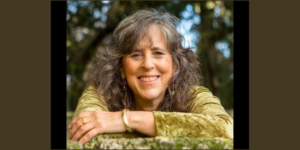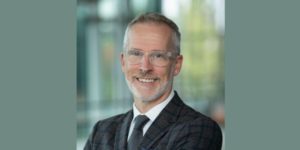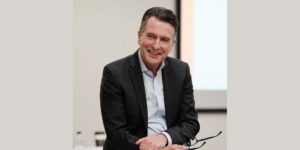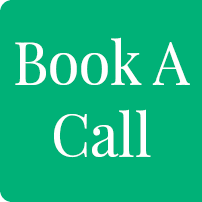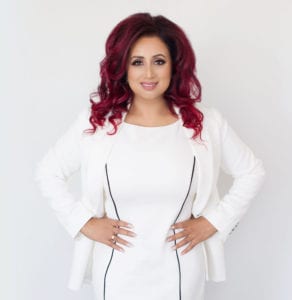Raj Girn: Hey, guys, thanks for tuning in to another exciting episode of the `Transform Your Confidence Show.` In this last week of March, where our theme is Leadership & Advocacy, this week’s two-part series is entitled `Why Conscious Economics Is the Leadership Style of the Future.`
Here’s a bit about Rhiannon before I bring her on. In addition to being the president, CEO and owner of the Economic Club of Canada, Rhiannon is also the founder of the Jr. Economic Club of Canada and the CEO and co-founder of the Global Institute for Conscious Economics, where she is redefining what it means to be a corporate leader.
She is passionate about highlighting the most important issues of our times, which include creating a more prosperous and equal future for everyone. She has hosted countless thought leaders and change-makers through the years, including Canadian Prime Minister Justin Trudeau, former first lady Michelle Obama and human rights advocate Amal Clooney.
She is a tireless advocate for youth, having developed seven national programs under the Jr. Economic Club banner that have impacted over 50,000 young Canadians and provided over $150,000 in academic scholarships. Inspired by her own lived experience with child poverty, as the daughter of a single mother, Rhiannon has become a warrior for women and youth facing barriers.
Rhiannon has been acknowledged as one of the most accomplished influencers in Canada, having been named one of Canada’s change agents by Canada’s Business magazine, one of WXN Canada’s top 100 most powerful women in business three times, and became the youngest ever WXN Hall of Fame award winner in the fall of 2018. Please welcome to part 1 of the show, the fabulous Rhiannon Rosalind.
Here is Part One of our conversation:
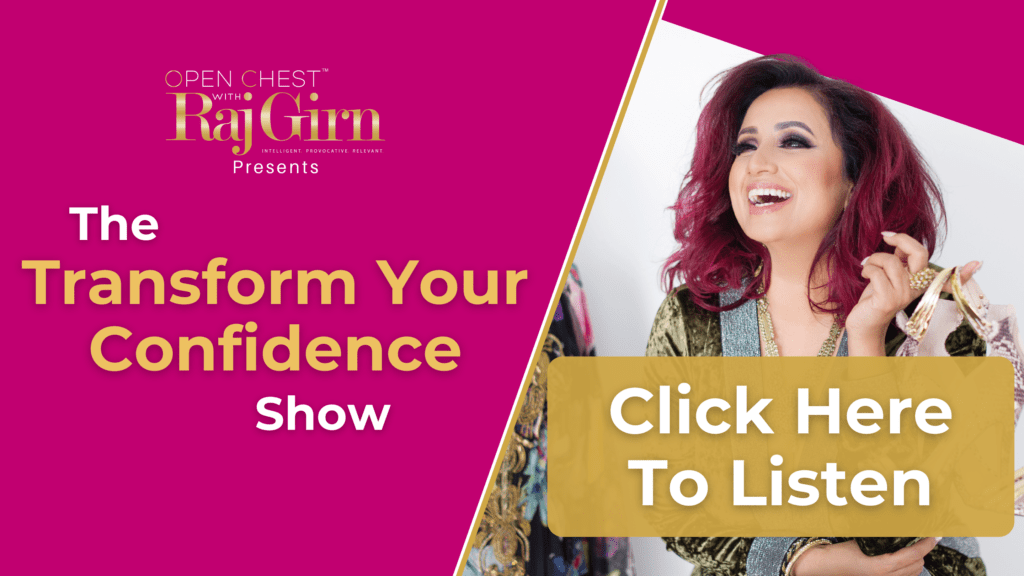
Raj Girn: Rhiannon, thank you so much for agreeing to come on the show. I want to preface our conversation a little bit for the audience. Just because we’re going to be tapping into a show that’s focused more on an ideology and how it can be implemented in the world that we live in today. So my goal with our conversation is to help people open their minds to leadership culture that is relevant in the world that we live in and work in today.
My reason for that is so that we are aligned to a more holistic approach than the traditional top-down ideologies of the past, that unfortunately, colleges and universities are still teaching people. They don’t really serve who we are as a human race, in my humble opinion, or the planet that we live on today. And I feel that your belief system, your ideology, and your business goals that I’ve seen that you talk about are quite aligned with this idea of being mindful and accountable and inclusive in our approach to our work and our living environment. So having the opportunity to speak to you today about this is truly an honour. And I want to thank you for agreeing to come on and educate my audience, Rhiannon.
Rhiannon Rosalind: Raj, thank you for having me. I’m so excited to sit and chat with you about this, and I’m excited about your enthusiasm about it. So it’s fun.
Yeah, absolutely. We’ll bounce off of each other, right?
We will. We definitely will.
So, let’s just jump right in. I want to begin by defining the term “conscious economics.” It’s a very interesting term and one that not many people are fully familiar with. And it encapsulates all of the above, all of the preface that I just talked about. In terms of it being synonymous with your organization, the Economic Club of Canada, has really lent to its awareness out there in mainstream society. So let’s begin first by letting people know what is conscious economics.
Yes, absolutely. Well, thank you for asking. So you said it, another way to say consciousness is awareness. So conscious economics is taking a much deeper awareness and that lens and looking at the economy and our systems through that lens. I like to break it down into a simple formula. I say that conscious economics is about the well-being of our labour force, our people. That means everything from social justice to inclusion, all the different ways that we show up into a space because of our lived experience, who we are, and looking at other pieces like racism, colonialism, these structures, they influence the way that we show up.
“Conscious economics is about the well-being of our labour force, our people. That means everything from social justice to inclusion, all the different ways that we show up into a space.” ~Rhiannon Rosalind
The well-being of our labour force, the well-being of our planet is fundamental. And it’s not just about environmental sustainability. It’s actually about our relationship with the planet and how that actually provides wellness to us. And then it’s the wellbeing of our profit systems. So I believe in business. I believe in profit. I believe in abundance. I believe in all of those things. So quite the contrary to when people start hearing about it, they think, okay, is this person actually for business? And I am. And the last piece that I include is art. And that is absolutely outside of the box for a lot of people. But I believe that creativity is our birthright as human beings. In order for us to be well and to be functioning at our optimum, we need to be creative. And you can’t mandate creativity. You have to make space for creativity. And so again, when I think about creatives, I don’t just think about musicians and painters and artists. Creativity is in all aspects, creativity in entrepreneurship, creativity in accounting. So it’s looking at how those things – people, planet profit, art – intersect to build what I call the conscious economy.
Right. So fascinating, because a lot of people aren’t familiar with the fact that this is on many levels what’s happening with entrepreneurship, for example. When we go back, you know, a couple of hundred years and, the advent of the Industrial Revolution and you know truly how that infrastructure is what mandated creating a stratified environment where everyone kind of fit into different pieces of a puzzle.
So it wasn’t very holistic per se, right? Now what we’re looking at is the amount of disruption that we’re seeing on a positive level, has a lot to do with all of these things, of these constructs that you just finished mentioning to everyone. Art and innovation and all of these things intersect today in how we’re changing the way that we do business. I’d love your comment on that before we move on.
Well, absolutely. And you said it. In the dawn of the Industrial Revolution, we were using our bodies as machines. Our work was much more robotic, more remedial. We were really on the assembly line trying to do these remedial tasks. Now we live in a world where we are being called to be more innovative than ever before. We are interacting with each other at a pace in a way that we’ve never seen before. And that’s going to require us to understand our own technology, our human technology better. How do we actually get to this peak performance optimization place?
It’s not about treating ourselves as a machine. It’s about actually tuning in, becoming more conscious, listening to our body, watching our environment around us and being able to respond to that. So I think we’ve become very disconnected from our own system that we have built in our very own bodies and brains. It’s like we are our own little computer system and we’ve been running some really shoddy programs for a long time. And so it’s about really upgrading the way that we think and being able to work with ourselves and our systems in order to create something more holistic and balanced.
Right. So can you share from your perspective, your experience and what you’ve seen, what benefits does adopting the ideology of conscious economics have on the quality of life like generally speaking?
Well, first of all, let me start off by telling you how I got here. And it was by doing everything but being conscious. You know, I grew up in a household where I was the first person in my family to get an education. My mother was a single mother. There was violence in my home. There were different things and challenges. And I had it in me that I had to be successful in order to break that chain that my family suffered from. And to me, success meant you get a good job, you work really hard. It’s all about money, status, material things that you accumulate. And so I did that. I went out and I did that and I worked and I worked and I worked, and I got to this place where I had all of the things on the surface level, but I wasn’t feeling fulfilled. And I actually was physically getting ill from how hard I was pushing myself running two organizations, a mother of two.
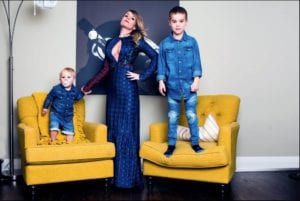
And this is a common story for so many of us to hear. And so for me, it came with my own personal awakening where I really started to see the breakdown in the disconnect between the way I was working, my idea of what success looked like and how my body was actually responding to those things. And so I started to implement this into my own life. And I truly say that all systemic change starts with the individual. If each and every one of us did one thing, which was be responsible for our own selves, we would see such a massive transformation in the world. A lot of us always think it’s all out there. It has to fix out here before I can be fixed or solved or it’s not fixed, but it’s being able to adapt to a different way of living.
So I started to ask myself some deep, fundamental, existential questions, and then I started to apply that to the work that I’ve been doing for the last decade at the Economic Club of Canada. I’ve been at the table with senior-level leaders and heads of state and policymakers talking about all the most important issues and the big three that keep coming back up time and time again that intersect everywhere are a) our environment and our climate, b) the mental well-being of our labour force and the erosion of the mental well-being of our labor force and this need for exclusivity and true equity at the table. And so these things, I believe, can be tackled if we start to become more conscious. And that is an internal process first. And we can talk about that more, yes.
You know, it’s really interesting you’re sharing this. I’m getting goosebumps because your story is parallel to mine. I grew up with this. I think it’s this whole immigrant mentality of when our parents come to a new country and they have a lot of children, which was the case in my story, there’s this limiting beliefs, kind of ideology where, you know, they stay within kind of the lowest realm of Maslow’s hierarchy and they kind of stay there.
They’re stuck in the survival level. Yes, right. And here we are, you know, realizing that all that survival, all the checkmarks, the criteria that create survival isn’t giving us anything else.
It’s interesting because it gives me context to this quote around conscious economics that I found online that I want to I share with you because it really encapsulates everything that you just talked about. And I’m going to quote it. “Conscious economics is a meditation on what human economy would look like if it were based on self-realization, or involution, rather than self assertion, which is evolution.” I need to ask you about that. What’s your comment on that?
“Conscious economics is a meditation on what human economy would look like if it were based on self realization, or involution, rather than self assertion, which is evolution.” ~Raj Girn
I think that that’s so beautifully articulated and said and that’s exactly what it is. It has to be this internal process first, where we are evolving within. It literally is enlightening our systems. And so, again, we don’t stop and ask the deeper questions because our labour force, our structure of our society has us going at such a pace that is so really and truly unnatural that we don’t actually have the time to stop and think, am I actually going in a direction that I want to go or am I just going in this direction because everybody else is? You know, am I going out and buying all of these things because everybody else has them or do I really need that or want that? And these are just simple little questions. But my daily practice starts with meditation and ends with meditation. And it’s you know, people think of meditation as this idea of, okay, I’m now a yogi sitting under a tree. It doesn’t have to be that. You know, meditating on our economy, meditating on our systems and inviting creativity in to be able to reimagine what could work look like? What could life look like? How could we feel better or more aligned? And these are questions that I’m constantly thinking about as I create programing and as I try to build more dialog and conversation around this.
Yeah, you know, let’s tap into that a little bit, then, Rhiannon. Let’s talk a little bit about some of these programs and these things that you’re doing at the Economic Club of Canada. Just so we can kind of tie in a little bit of what you do there. And you know what this concept is that we’re looking to kind of really bring out into this world because the disparity is so huge that there needs to be something that’s done about it. So talk to me a little bit about some of this programing that you’re talking about.
Yeah, absolutely. So first and foremost, the Economic Club is a platform where we host conversation. So usually about one hundred conversations a year. And what I’ve been trying to do is to really open that up to a more intergenerational dialog. So I know Raj, you came to the launch of Conscious Economics before the pandemic, just before, and we had 6,000 people attend. And this particular program saw 3,000 business leaders and policy makers coming together with 3,000 young labourers, young leaders, 30 and under, coming around the same tables, sitting at the same tables, talking about this idea of a conscious economy. And President Obama, of course, was our first speaker there. From there, we’ve launched a couple of really interesting programs.
One staple program is called Mindfulness and Money. It’s a look at the economy and our relationship with money and finance through this holistic lens of mindfulness. It’s trauma informed. It is really looking at our different spectrum of understanding when it comes to our relationship with money and the economy in the way that we show up. And I’ll give you a really interesting example. I mentioned before that I grew up in a household that was struggling and yes, survival mode was what I knew. It was like it was programed into me. So I only felt like I was well when I was doing so much all the time, pushing, pushing, pushing. I would get to the point where I would reach a particular pillar of success financially and I would it would feel safe, it would feel comfortable, and then I would go out and take a really big risk and I’d put myself back into that seesaw of just almost drowning again.
And when I started to do the conscious work and understand what were the program limiting beliefs, and you said it perfectly, that I was actually perpetuating subconsciously without realizing. How was that impacting the way I ran my business? How is that impacting my relationship with money? And my relationship with myself as an entrepreneur? And so it was it was through understanding that and unlocking that and then being able to actually look at what my core values are, what I actually want, which is not chaos, but peace, you know, and then being able to correlate that. And so mindfulness and money actually takes our participants on that very personal journey of uncovering those beliefs and being able to look at it through the lens of the way they show up in the economy. They show up in their relationship to money and then actually reprograming. So this has been a really exciting program that we’ve launched that we’re just so excited about.
And we’re also getting ready to launch a huge program that’s going to be going right across the nation, working with women across the labour force, particularly BIPOC women, so black, indigenous and other racialized women, to really actually go deeper into not just the rhetoric around pipelines and why women aren’t coming up into the C-suite or into the upper ranks, but really looking at these social and emotional issues that are coming up that are preventing us from stepping into those roles. Because I suspect that in a lot of cases, it’s also us not wanting to go there. And there’s a reason why. And it’s something that we’re not talking about that this system, the way it’s designed, it’s not working for us. It’s particularly not working for many of us women. It just it’s not conducive to raising families, to having partnerships, to doing all the many other things that we do. And it’s got to change. And so these are some of the projects that we’re starting to look at. So bringing researchers together with policymakers and business leaders and young people and diverse groups to really start to look into these things much more deeply.
So who who can actually benefit from these programs?
Anybody and everybody. And again, we do a lot of work with young people, but we are all about the inter-generational dialog. The thing is, is that the longer you’ve been in the system and perpetuating it, the harder sometimes it is to on to un-program or to deprogram. And so that’s why it’s so, so relevant to be speaking with young people right now and to actually be, just like you said, starting to change the way we’re teaching in university and at school because we don’t want to keep pushing out that same mentality when that’s not the world that we live in today at all. Even when you think of just how the traditional classroom is set up with the rows of desks, this was all to set people up to work in factories, to be able to conform, not to create or to disrupt or to innovate. So everything needs to be sort of re-thunk. And that’s why it’s so interesting to, again, for me, have this cross-pollination where we are starting to blend art and culture and social justice and all of these different pieces into the way that we actually think about corporate and economic infrastructure.
“The longer you’ve been in the system and perpetuating it, the harder sometimes it is to un-program or to deprogram.” ~Rhiannon Rosalind
Absolutely. And the stats prove it out there. Just, sharing one. Female founders get less than one per cent of funding out there, that’s venture capital funding. We know this, right? But the statistic shows that they are more successful per capita to men who get funding. So what can be the difference there? There’s a difference in how we lead as women. That is predicated on a lot of what you just talked about. And I really want to step into that part of our conversation in a moment. But before I do, I want to ask you this just so we can create a little bit more understanding for anyone that’s just joining us. How can we incorporate this entire concept that you’re talking about from a practical standpoint in the work environment so that it benefits everyone down the food chain?
This is a complex question because every organization functions differently and that hierarchical infrastructure is still very much present. And so, again, what I think we have to do first and foremost is we have to find it within ourselves first. And I encourage leaders. That’s the number one thing we need to have, is we need to have our leaders at the top be able to have this awakening, this conscious awakening, where they can actually understand that although we think we’re rational beings that are making logical decisions all the time, we’re not. Our subconscious actually influences over 90 per cent of what we are actually doing, our subconscious beliefs. So this is something that I think we need to start to really have conversations and open dialog about, which it sounds crazy, but this is still extremely progressive in terms of talking about this. Not everybody is welcoming this conversation. Some more open to it than others.
I also think we really need to see a shift, though. And again, I bring it back to this conversation around, I’m not going to say gender, but I’m going to say a masculine and feminine energy. When we are looking at our current systems right now, the patriarchy, if you will. It’s all of us that are influenced by that. It’s men, women and all identities that are influenced by this one way of looking at the corporate infrastructure, one way of looking at progress, of the way to do things. And it is the more sort of yang masculine energy that is all about going out, dominating, competition. You’ve got to have it all lined out. Whereas the feminine energy is the more creative energy, it moves, it’s more intuitive, it’s open to receive. and we have to start to actually shift even how we feel in our bodies to be able to accept that and to let that in. It requires more time, more space, and that doesn’t equal unproductive.
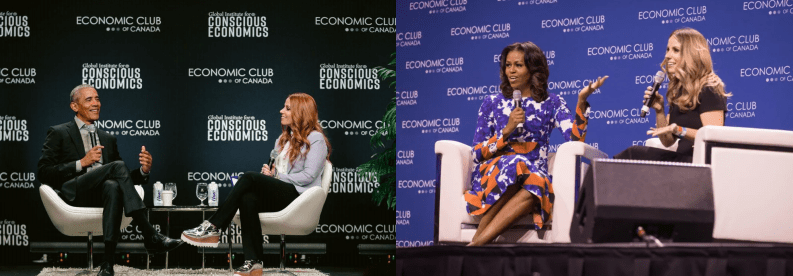
So we have to kind of retrain and reprogram ourselves. I’m seeing a lot of organizations now that are talking about implementing a 28-hour workweek and this 28-hour workweek is actually building in time for rest. And in this period of rest this isn’t about laying around and getting our nails done. This is about opening your mind up to be able to receive in new creative ideas, to be able to drink in new information, to be able to integrate the things that we are learning throughout the course of our week. And we’re actually seeing more productivity and better results for people that are implementing some of these things. So it’s really interesting stuff.
Yeah, it really is. And I’m smiling because I was listening to a numerologist who was talking about the advent of the divine feminine. And she was talking about how neurologically, historically speaking, the way that even our calendar has been created, which is 12 months, also pushes out the female energy when neurologically the female energy is around the number 13.
So if you look so, if you look a lot at the number 13, it has gotten a bad rap. People won’t buy homes on floor 13 or that has a numerology that adds up to 13. And historically speaking, a lot of records said that there used to be 13 months, but the calendar system became masculine and they removed the 13th to create an energy force, which I personally believe in, and I know a lot of people think this is woo-hoo. I do feel that every aspect of existence has the connection to each other, from an energistic perspective. I do believe that the stars, the sea, humans, animals, our wildlife, everything is connected and how we use the energy for self and others is everything.
And I think that a lot of what you’re talking about here is what that’s about. I mean, when I think of conscious economics and why I’m so excited to have you on this show and I feel like I could talk to you about this for hours, I feel that people need to really tap into this other way of looking at life that’s beyond the structures that we’ve had built around us and in us. The in us part is the worst part.
Yeah, absolutely. And you’re so right. And again, it’s interesting to actually if we take the woo-hoo out for a second. Picture yourself sitting in a room and somebody walks in the room that’s angry. They haven’t said anything, but they’re angry. Most of us can feel that energy. We can feel a shift in that energy. And again, this is not some out there piece, this is quantum physics at its best. And as our science, you know, science can only ask the questions that our consciousness allows us to ask. So we’re only starting to just scratch the surface of quantum physics, quantum energy field, how all of these pieces intersect. And it is very, very true that some of these more intuitive aspects of ourselves have been denied and suppressed and repressed. And we can go back into the suppression of women. We can go back into this idea of women being burned at the stake, called witches, all of these things, and how this is actually just natural abilities that we have inside of ourselves that can be cultivated and in fact, in other places of the world are cultivated and are very, very, very accepted.
And so this is something that I think we really have to start to think about. And it’s really not woo-hoo at all. These are the incredible extrasensory abilities that we all have that we can all work on that can actually help us to create better systems that are in harmony with each other, ourselves and the planet. And so really, in some ways, one of the best places to kind of anchor and learn is really to study some of the ancient knowledge and wisdom of our Indigenous elders, especially here in Canada, as wisdom keepers and Indigenous peoples all around the world that hold some of these ancient traditions. And I really believe that this new era, this new economy that we’re stepping into, it calls for the integration of the ancient and the forward technological age actually coming together. That’s the frequency of what we call the Age of Aquarius of this time of now that we’re stepping into, which is just so unbelievably beautiful and special.
Absolutely. And we can see it right? Mother Earth has just said, stop. We need to realign and we need to reset the world and the energy flow so that it is very inclusive for all of its beings because we are all equal.
We’ve just created systems that have created the disparity. So let’s talk a little bit about that. And Rhiannon, as a professional in a leadership position, because I always come back to people who are decision makers, people who have the power to make change happen. And that also is a whole other discussion because, at the end of the day, masses make the change happen. We see this in French Revolution. We’ve seen this, historically speaking, in many different revolutions, but for want of kind of honing back in to people in positions of power, positions of leadership, what are some steps that can be taken to ensure that we’re able to properly incorporate some of these things that we’re talking about that is around this idea of being more inclusive and conscious of every living thing.
We need massive change in terms of who is at the leadership table. And this has been something that I’ve been so passionate about for years, really trying to change the makeup of who is at the table, because, again, in my opinion, the younger generations, they are more evolved. They come more evolved than the ones before. And I say that in no offensive way. But as you can see, society continues to evolve. And if I’m a product of my parent’s generation, then their parent it’s before them, were in a different stage and state, so I’ve been afforded a much more progressive understanding of life and interconnection because I’m just at that stage and I’ve been able to benefit from that. So we see society waking up to many of these issues. We’re starting to see people talking about their diets and eating more plant-based and thinking more about the environment and all these pieces that evolution is happening. So I really challenge leaders to bring more young people to the table. We need a greater balance. We need more women and in spaces and places of leadership.
“I really challenge leaders to bring more young people to the table. We need a greater balance. We need more women and in spaces and places of leadership.” ~Rhiannon Rosalind
And again, I know many of us, we feel it’s not for us. I don’t want to step in there. I don’t want to have to change who I am in order to go in and play a particular role. I felt like that for so long. But now I see that I am who I am. I’m here with this particular message and understanding of what I know and I’m here to spread it. And yes, people may be shocked. Some people may write me off, but there’ll be others that will be on that frequency that will hear it and will feel comfortable to come forward to you. And and so it is, I think, this time about authenticity, speaking openly, honestly and really looking at the challenges that we face. I keep coming back to the mental health and wellbeing of our labour force. Covid-19 has only escalated this to the point that we are not doing well, like we are just not doing well. And if we come back to even the basic fundamental, even if you say, no, I’m fine, that’s not me.
Any species that could be destroying the very place that gives it life is not well, you know, and that’s just it. I mean, look around us. Our Earth is suffering, you know, the very beautiful home that we call home, Mother Earth. She’s not doing well. So how could we be doing well? If we are all interconnected, we look and see how she’s doing and we know that’s a reflection of how we are doing. And so this is just something that I think we need to start thinking about. so I really want to see change on all levels and I want to see new faces coming into positions of leadership. And it is actually not as difficult as you might think, because in this moment right now, especially because of this pandemic. I know that there is so much that is just awful about this time, but there’s so much good that’s coming from it as well because it is shining a light into the dark corners that we wanted to ignore, that we were too busy to see. It’s almost like we’ve been all sent to our rooms for a deep meditation, even just being in your own energy.
You know, I used to be around I used to be probably chairing four or five events a week. I was around hundreds of people every day, and I never really thought about what that did to my own energy space of all that was in me and all I was consuming. It was very hard for me to clearly channel in what I needed or what I felt. And so this time has allowed me to get much more sovereign in my own space and in my own energy and be able to think more deeply about some of these things. So that would be first and foremost. And we need more people talking about these pieces and not being worried that they are going to be written off as woo-hoo or out there or not relevant. This is absolutely relevant to now. We are in, what I call, a mass awakening on the planet, and it is time that we start to think about some of these things.
Yeah, absolutely. And it’s interesting that you share that because, you know, I feel that a lot of what has been created has been created for a specific currency intention. If you go back around 60, 70 years, for example, and Rhiannon, this whole idea of alternative medicine was very, very a part of mainstream society.
It wasn’t until Big Pharma came along and decided to create a currency around the version that they wanted to sell, which basically cyclically is, make them sick, give them medicines. So, the food cycle, the chemical cycle and all of that, which is a little bit off topic. But it’s an example of the way that we have created a society that we think has been there forever that way, therefore, it needs to stay that way when it’s really only been in the last 100, 150 years that we’ve removed a lot of the holistic way that centuries and thousands of years of human existence have actually lived on.
Yes. And I am like I said, I’m a believer in the ancient wisdom and the new technological age and the blending and balancing of these two pieces. And absolutely when we go into our 150 year-old medical system that we know now here today, we are ignoring other pieces that are out of balance. A lot of our system right now is about masking something rather than understanding the root cause of what is actually there. So I have heartburn, instead of wondering why I just take a pill so I don’t feel that feeling anymore. But, you know, why is that happening? The body is always speaking to you and always expressing itself to us through the way that it feels. And so, again, I love this idea, too, of other forms of currency. And I’ve been speaking about that a lot. Our data is currency. Our energy is currency. Our well-being has a currency. So all of these things are starting to come into the fold and we’re starting to think about these. And it’s not about eliminating one for the other. It’s about how do we find the balance and the intersection of now. Because we’re not asking to go back to the way that we lived thousands of years ago. We’re asking to take now and apply the knowledge of both into this new space, which is very, very exciting.
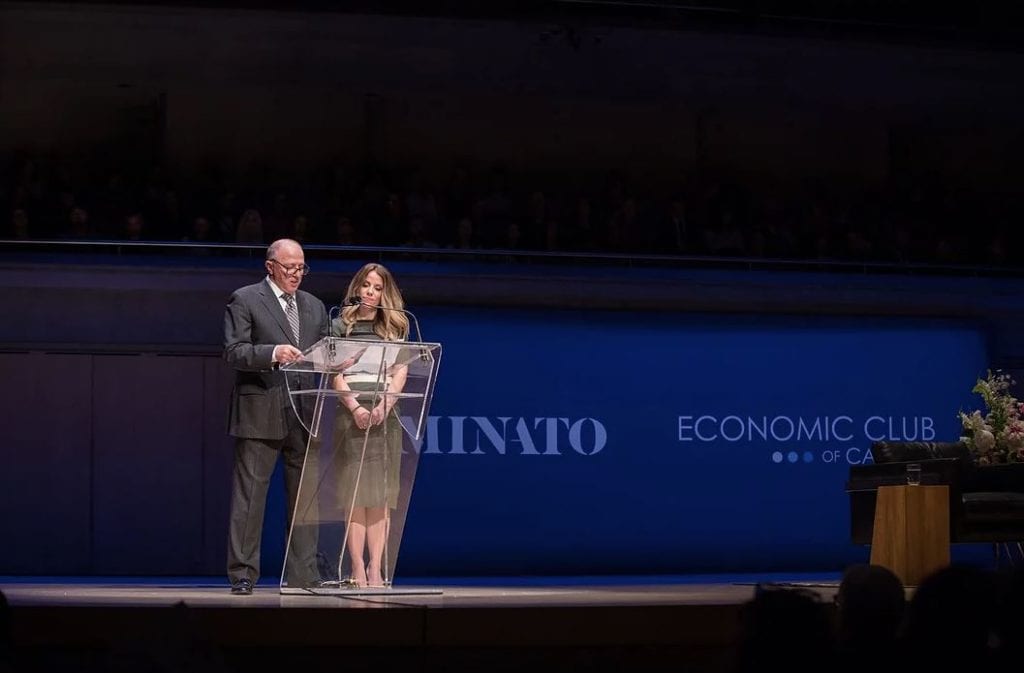
Absolutely. so how can decision makers tap into the Economic Club of Canada to solicit guidance or resources to add this whole idea of conscious economics into their company’s infrastructure? Because I know that there’s going to be a number of people listening, say, I want that in my company, but I don’t know how to do it. Can you tap into that a little bit?
Absolutely. So I recommend people go to consciouseconomics.ca. If you’re interested in getting involved and signing up to learn more about what we are doing, we host a number of different programs. We have one program right now that’s called the Lunar Club. This is a monthly gathering for women right now, women of all ages, all backgrounds coming together just to really sit in a space where we allow this conversation of consciousness to exist and we allow that conversation to influence the way we think about the labour force to the to the way we show up in our relationships. So this is one place where you can absolutely integrate that. I suggest for anyone listening right now that says, how do I start? How do I start? Where does it begin?
I recommend the best thing to do is meditation. And I started my practice with three minutes a day on an app on my phone. I was like, there’s no way that this is too short to do anything. Like there’s no way. And it literally transformed my life just to be able to sit in the stillness, know that the chatter that you hear with in your mind is not you. It’s not you. There’s another part of you, the observer in you that can go above that space and can start to cultivate and call in another higher, more evolved part of you that we all have inside of us that we forget about as we are constantly allowing our thought chatter to go uncontrolled. It’s like we all understand what it means to train our physical bodies at the gym, and we know what it means, over time, to work out a muscle and to see it evolve.
But we don’t think about our mind and brain as a muscle that we have to also train. And so I often think about mine now. I’m in a space where my mind still goes off on these interesting tangents and loops. And I picture it like it’s a little dog on a leash. And it’s like, do I want to let the dog walk down that street or do I want to keep going forward? And this is the thing. It’s we all have it. So it’s something for all of us to think about and and for all of us to start to speak about. And there’s some great, great books that were critical for me in my awakening, for sure. ‘The Power of Now’ being one of my favorite favorite, Eckhart Tolle, is just such a staple. And ‘The New Earth’ as well, which is also written by Eckhart Tolle. And I just I recommend you to start seeking out the information, calling it in, and you will find it. It is there, yes.
Absolutely. And you touched base on something that I think is so fundamental in our evolution as people and as a society. And that is the in the knowing. If you don’t know, having the judgment around not knowing is a very dangerous place for you to be for yourself and for others. And this has been very much the way that we’ve lived in society, is, you know, ignorance has caused a lot of traumas and a lot of terrorism in this world. And ignorance is not bliss. I do not believe that ignorance is bliss.
And some of what you were talking about there really reminds me of some of the work that I’ve been, Rhiannon. You just tapping into the fact that there are different planes that we exist on, even within ourselves. We have the subconscious, we have the conscious, which is most of what we tap into, and then we’ve got the super conscious, which is what you’re talking about when you are visiting your highest self, right? And it’s interesting that you say that because a lot of people say, well, you have to create quiet and silence in your meditation. I don’t agree with that. From my own personal practice, I believe that you need to hear what’s coming in.
“There are different planes that we exist on, even within ourselves. We have the subconscious, we have the conscious, which is most of what we tap into, and then we’ve got the super conscious.” ~Raj Girn
Yes, absolutely. And meditation doesn’t have to happen on a cushion, sitting in silence, you’re right. Meditation can be walking through the forest in nature. Meditation can be taking a bath and stopping all the other noise. Put your phone down and just be. How often is it that we just are with ourselves? You know, we’ve become so accustomed to trying to numb or change or we feel so uncomfortable with being with ourselves and being in quiet. And that’s because we’re holding a lot and we all are. And I have so much compassion for all of us right now. I am so not about the pointing of the fingers because we are all victims of this unconscious system that we continue to perpetuate. It runs through all of us. I have to check myself every day because as much as I want to do this, I am still programmed within that system that I’ve been brought up in. And you perpetuate it all the time without realizing.
And so it’s always taking those moments to stop and to ground and grounding for me is being in nature, and it’s also just being in my body. So, again, a beautiful practice is going and just sitting in silence and just putting some attention on your toes, your feet, your knees, just bringing yourself back into your body. And just even these small practices. I promise you, it sounds so like this isn’t going to change anything. I want the quick pill or I want the quick fix. But doing this consistently, over even just a couple of days, you will notice a difference in the way that you feel. And it was shocking to me. But I am someone who, like I said, had struggled with so many different pieces and had really had my own trauma growing up that I too, had my own addictive behaviours and things I was doing to numb and not face my past. And it was scary. It was scary to really stop and to say, wait a second, rather than continuing to run, what if I faced the things that I’m most scared of as challenging as that is?
And this is what we’re doing as a society right now, this is the collective exercise. Instead of saying, oh, that doesn’t look good, that racism doesn’t look good. Oh, let’s put something on our website to say that we’re for this. Why don’t we stop and actually look at it? Why don’t we look at where we’re actually at. Why don’t we stop denying that it exists and start to actually embrace this is where we are. This is where we are. And sit in that for a minute. That is that will bring forward a different kind of consciousness when we stop and admit and just admit. Yes.
Absolutely. Such a powerful concept to think about Rhiannon and then it begs like a whole other show. So, you know, I’m going to bring you on again.
I’m down for it. I’m having so much fun.
So am I. Absolutely.
Thank you so much for staying until the end, guys. I really hope you enjoyed this show and will action the many insights that were shared. This topic is quite revolutionary in that it questions and brings to task all the failing infrastructures within the work environment that have piled up over the past 150 years since the advent of the Industrial Revolution that has cut all those into a limiting beliefs, mindset where we have been led to believe that there is only one way to work and live – a one size fits all mentality that empowers a few by slaving the masses.
An aggressive opinion, I know, but one that if you were to be truly honest with yourself, you would agree holds some truths, such as if you were brought up to believe that you could do anything, would you have done what you chose to do? And is that the right thing that you should be doing to take you to the truth of the journey that you should be living? This is the most important question you can ask yourself, because the answer will take you on the journey towards your singular truth, because you’re on your journey to live your truth and not someone else’s. Or perhaps you are, but I hope not.
If you found this episode helpful and it opened your mind to an alternative way of looking at leadership, I’m glad. I ask that you subscribe to this podcast. On your Apple and Android platform, search The Transform Your Confidence Show on your Youtube channel at the Open Chest Confidence Academy. And if you’re an avid reader like I am, we’ve also transcribed every podcast into a blog which can be accessed at TheOpenChestConfidenceAcademy.com/media/our-media. And also please hop over to our private Facebook group at Transform Your Confidence, whether on networking opportunities as well as knowledge and resources about mindset, media, communications, branding, marketing, leadership and advocacy for busy executives and entrepreneurs like you who are seeking to elevate the quality of their life. You know, you’ve got to be there. And as always, thanks for tuning in and until next episode, take care of yourself.
To contact Rhiannon Rosalind: LinkedIn, Instagram, Twitter, Facebook


